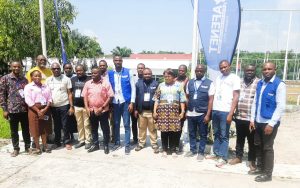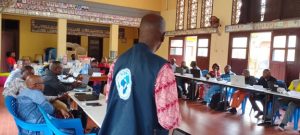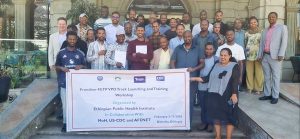Central African Republic, Guinea laud AFENET’s efforts against polio and other vaccine-preventable diseases
-
by
AFENET


Public Health stakeholders including Government officials and development partners in the Central African Republic and Guinea [Conakry] have appreciated efforts by the African Field Epidemiology Network (AFENET) towards fighting polio and other vaccine preventable diseases.
This emerged in discussions with various stakeholders during a recent working visit to the two countries by AFENET’s Francophone Africa Polio Outbreak Coordinator, Dr. Yaya Ballayira.
Context
In 2020, Circulating vaccine-derived poliovirus type 2 (cVDPV2) outbreaks expanded in countries across Africa. Between May 2019 and Week 35 of 2024, 45 cases of cVDPV2 have been laboratory-confirmed in the Central African Republic in children under 15 years of age with acute flaccid paralysis (AFP) and in 21 environmental isolates. Relatedly, in 2023, 73 cVDPV2 were recorded including 45 cases of AFP, 28 positive isolates from environmental surveillance in Guinea. In 2024, the country recorded 13 cases of cVDPV2 and cVDPV3, including type 2, 5 cases of AFP and 5 positive isolates from environmental surveillance, and 3 cases of cVDPV3 in AFP cases. At the end of the classification of all cases, nine (9) compatible cases were declared by the polio expert committee.
Through the AFENET/CDC Polio Cooperative Agreement (CoAg), CAR and Guinea are among the countries where AFENET has since 2020 been deploying consultants to contribute to strengthening AFP and VPD surveillance and population immunity to polioviruses.
Commendation
“While appreciating our work, the Minister of health, Dr. Pierre Somse, would have liked a longer period of supervision in view of the challenges related to the fight against the disease in the Central African Republic,” said Dr Ballayira in a debrief. “The CAR FETP Program Director greatly appreciated the work of the AFENET resident advisor, whom he finds wise and open to advice and who participates in the Ministry of Health and Population (MSP) cabinet meetings.”
Meanwhile in Guinea, Dr Ballayira said it emerged from the meetings that vaccination coverage has not reached the desired coverage for about 10 years. “They expect partners to support the Expanded Program on Immunization in improving vaccination coverage. The director finds the deployment of Field Epidemiology Training Program residents and graduates as a contributory solution.”
The WHO Country Representative in CAR Dr Nsenga Ngoy and his team appreciated the support of the AFENET international polio consultant and the project for deploying national consultants in nine health districts. They mentioned that this project has contributed to the improvement of polio indicators in the deployment districts.
Equally in Guinea, Dr Ballayira met the WHO Country Representative Dr Jean Marie Kipela and the GPEI team led by the Country Coordinator Dr Hama Balkissa Modibo. From the discussions, according to Dr Ballayira, “We learnt that the consultant’s work is well appreciated by the GPEI team, that his presence in Koundara health district has made it possible to detect, for example, a yellow fever epidemic in Koundara.”
In both country visits, Dr Ballayira made countryside site visits to Sibut in CAR and Koundara in Guinea, where local authorities appreciated the efforts of the AFENET recruited consultants towards capacity building and assisting district staff who are worn out due understaffing.
Challenges
However, in both countries, in addition to manpower challenges, insecurity (in some areas of CAR), poor roads worsened during the rainy season, poor vaccination coverage in some areas, project sustainability and the high cost of living were some of the impediments cited.





